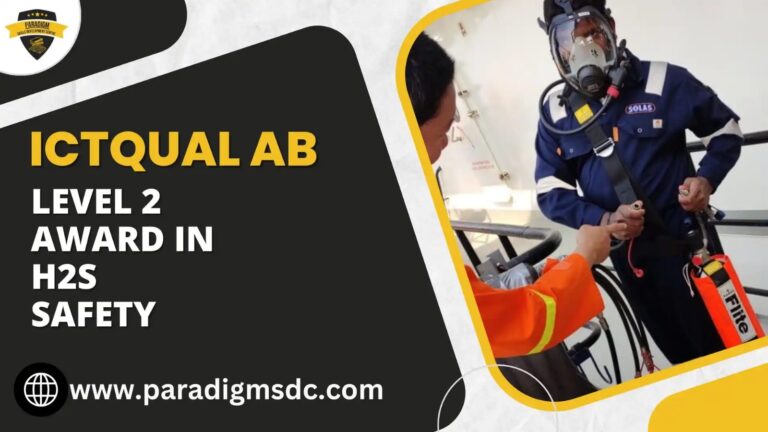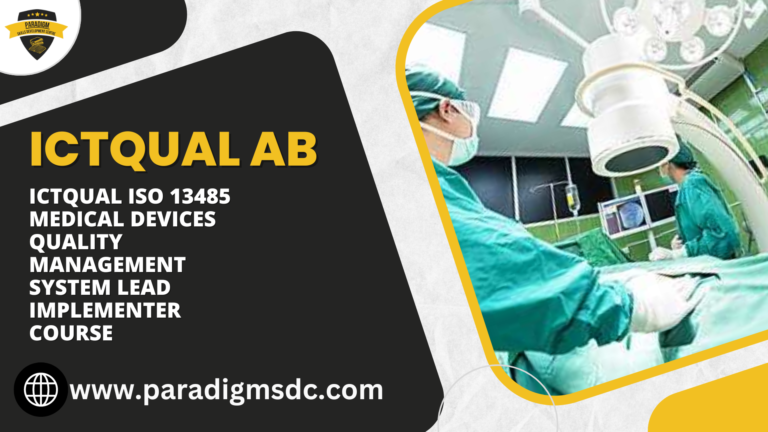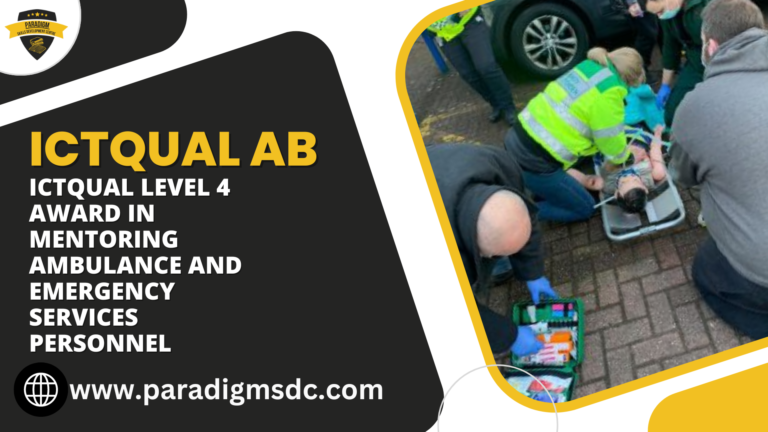Course Introduction
The ICTQual Level 3 Award in Anaphylaxis and Basic Life Support is a specialized training program focused on preparing participants to handle anaphylactic emergencies confidently and competently. The course combines theoretical knowledge with practical skills, ensuring that learners are well-prepared to recognize anaphylaxis, administer the necessary treatment, and provide essential life support when needed.
Course Overview
This course offers a blend of online modules, interactive workshops, and hands-on practical sessions. The curriculum covers the fundamentals of anaphylaxis management, including identification, treatment, and prevention, as well as the core principles of basic life support. The course is designed to be engaging, informative, and applicable to real-world emergency scenarios.
Course Study Units
- Understanding Anaphylaxis
- Management of Anaphylaxis
- Basic Life Support (BLS)
- Legal and Ethical Considerations
- Practical Skills Training
Learning Outcomes
Upon completing the ICTQual Level 3 Award in Anaphylaxis and Basic Life Support, participants will be able to:
Understanding Anaphylaxis:
- Define Anaphylaxis: Understand the definition and characteristics of anaphylaxis.
- Identify Triggers: Recognize common triggers and allergens that can cause anaphylactic reactions.
- Recognize Symptoms: Identify signs and symptoms of anaphylaxis, including both mild and severe reactions.
- Pathophysiology Knowledge: Understand the physiological processes involved in anaphylactic reactions.
- Severity Assessment: Differentiate between mild, moderate, and severe allergic reactions.
- Risk Factors: Identify individuals at higher risk of experiencing anaphylaxis.
Management of Anaphylaxis:
- Emergency Response Procedures: Demonstrate knowledge of immediate actions to take in the event of an anaphylactic reaction.
- Adrenaline Administration: Understand the indications for and correct administration technique of adrenaline auto-injectors.
- Airway Management: Demonstrate techniques for managing airway obstruction and respiratory distress.
- Casualty Positioning: Apply appropriate positioning and reassurance techniques to support the casualty.
- Communication Skills: Communicate effectively with the casualty, bystanders, and emergency services during anaphylaxis management.
Basic Life Support (BLS):
- CPR Techniques: Perform high-quality cardiopulmonary resuscitation (CPR) on adults, children, and infants according to current guidelines.
- AED Usage: Demonstrate the correct use of an automated external defibrillator (AED) in conjunction with CPR.
- Choking Management: Apply appropriate techniques to manage choking in conscious and unconscious casualties.
- Recovery Position: Position an unconscious casualty into the recovery position safely and effectively.
- Teamwork: Collaborate effectively with other responders during BLS interventions.
Legal and Ethical Considerations:
- Duty of Care: Understand the duty of care responsibilities when providing emergency assistance.
- Consent and Confidentiality: Respect and maintain patient confidentiality and obtain consent where appropriate.
- Legal Frameworks: Understand legal frameworks surrounding emergency treatment, including relevant legislation and regulations.
- Documentation: Demonstrate knowledge of documentation and reporting requirements following an emergency incident.
- Ethical Decision Making: Apply ethical principles in decision-making during emergency situations.
Practical Skills Training:
- CPR Skills: Demonstrate correct technique and timing for chest compressions and rescue breaths on adult, child, and infant manikins.
- Anaphylaxis Simulation: Participate in simulated scenarios to recognize and manage anaphylactic reactions effectively.
- Adrenaline Auto-Injector Use: Practice using adrenaline auto-injectors safely and confidently.
- Choking Management Practice: Perform choking management techniques on manikins to dislodge airway obstructions.
- Effective Communication: Practice clear and concise communication skills during emergency simulations and scenarios.
Course Benefits
- Comprehensive Knowledge: Gain a thorough understanding of anaphylaxis management and basic life support.
- Practical Skills: Develop essential hands-on skills through practical training and real-world scenarios.
- Enhanced Confidence: Build confidence in handling anaphylactic emergencies and providing life-saving interventions.
- Career Advancement: Improve career prospects in healthcare, emergency response, and first aid training.
- Improved Patient Outcomes: Contribute to better patient outcomes through effective emergency response and management.
Who Is This Course For?
The ICTQual Level 3 Award in Anaphylaxis and Basic Life Support is ideal for:
- Healthcare professionals, including nurses, paramedics, and doctors.
- First responders and emergency medical technicians (EMTs).
- School nurses, teachers, and childcare providers.
- Sports coaches and fitness instructors.
- Workplace first aiders and safety officers.
- Anyone interested in gaining skills in emergency response and life support.
Future Progression
Upon completing the ICTQual Level 3 Award in Anaphylaxis and Basic Life Support, participants can further their education and career development through:
- Advanced Life Support Courses: Pursue higher-level qualifications in advanced cardiac life support (ACLS) or pediatric advanced life support (PALS).
- Specialized Training: Obtain certifications in specific areas such as airway management, trauma care, or pediatric emergency response.
- Higher Education: Enroll in undergraduate or postgraduate programs in nursing, paramedicine, or emergency medical services.
- Professional Certifications: Gain additional certifications in first aid, emergency response, and healthcare training.
- Leadership Roles: Progress to supervisory or managerial positions in healthcare, emergency services, or safety training organizations.
The ICTQual Level 3 Award in Anaphylaxis and Basic Life Support is an essential course for anyone committed to providing safe, effective, and life-saving care in emergency situations. Equip yourself with the skills and knowledge to handle anaphylactic emergencies and deliver basic life support, and take your career to the next level in the healthcare and emergency response fields.







